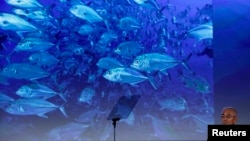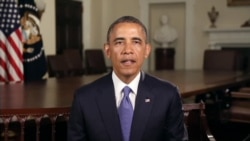U.S. President Barack Obama announced a plan on Tuesday to create the world's largest marine preserve, significantly expanding a remote region of the Pacific Ocean where drilling, fishing and other commercial activities are prohibited.
Obama announced the proposal in a video at the U.S. State Department's Our Ocean conference in Washington.
“If we drain our oceans of the resources, we won’t just be squandering one of humanity’s greatest treasures. We’ll be cutting off one of the world’s major sources of food and economic growth, including for the United States," he said. "And we can’t afford to let that happen.”
Carbon pollution is making the world's oceans more acidic, pollution is threatening marine life and overfishing could wipe out entire species, Obama said in his videotaped announcement.
“If we ignore these problems, if we drain our oceans of their resources, we won't just be squandering one of humanity's greatest treasures,” Obama said. “We'll be cutting off one of the world's major sources of food and economic growth, including for the United States. We cannot afford to let that happen.”
Using presidential authority that doesn't require new action from Congress, Obama said he was seeking the protection for "some of our most precious marine landscapes," just as Presidents George W. Bush and Bill Clinton have done.
The White House said the president is seeking to protect waters in the Pacific Remote Islands Marine National Monument, located in the south-central Pacific Ocean, between Hawaii and the U.S. territory of American Samoa.
Officials said the exact boundaries of the preserve have not been set, but that Obama could expand the protected area already in place from 225,000 square kilometers to more than two million.
The area would be off-limits to drilling, fishing and other actions that threaten fragile marine life, White House officials said.
Obama, who grew up in Hawaii, also called for the government to create a program to deter black market fishing as a way to further protect marine life.
“Today, I am building on that progress by directing the federal government to create a national strategy to combat black market fishing that threatens our oceans, undermines our economy and often supports dangerous criminals,” the president said.
Black market fishing and seafood fraud, in which seafood products are mislabeled to hide where they were harvested, cost the legitimate fishing industry $23 billion a year, the White House said, as reported by the AP.
It’s expected that Obama’s executive action to protect the underwater Pacific will run into vigorous opposition from members of the deep sea fishing industry, including anglers who catch tuna, as well as some members of Congress.
Republican Congressman Doc Hastings of Washington State called the zoning proposal a “unilateral action” by an “imperial president” to impose new regulations and restrictions on economic activities, including fishing, recreation and energy production.
Hastings, who heads the House Natural Resources Committee, accuses the president of “blatant disregard” for possible economic consequences.
The Pacific Ocean Sanctuary plan could go into effect later this year following a public comment period.
The Washington Post first reported on the adminstration’s plan on Tuesday.
Actor urges conservation
Actor and philanthropist Leonardo DiCaprio also addressed the Our Ocean conference on Tuesday.
DiCaprio announced that his foundation, which provides grants for environmental and humanitarian issues, was committing $7 million toward ocean conservation projects over the next two years.
He said the money was available to organizations, communities or nations to establish meaningful ocean reserves.
“We cannot afford to be bystanders,” he said. “We need to step up now” to protect the oceans.
But, he added, none of these measures can be implemented without proper world leadership in conservation.
"Unfortunately today there's no proper law-enforcement capacity and little accountability for violating the law," DiCaprio said. "It's the Wild West on the high seas. The ocean is an under-regulated marketplace right now.
"Even though the ocean covers 71 percent of our planet, less than 1 percent are fully protected as marine reserves where fishing is prohibited," he added.
On Monday, opening the conference, Kerry called for a global effort to protect the oceans, which he said were under threat from too much fishing, acidification from climate change, and marine pollution.
Kerry called for all nations to move beyond talks and studies to taking specific steps toward a global agreement to protect the oceans.
Kiribati bans fishing
Also Monday, Kiribati President Anote Tong announced that despite concerns about the economic fallout, all commercial fishing would be banned from January 2015 in the Phoenix Islands protected area.
"Addressing the challenges of climate change calls for very serious commitment and sacrifice," Tong said, according to the French news agency AFP.
"The projected loss of revenue weighed very significantly in our consideration, but in the final analysis we made the decision to persist with effective sustainable strategies," he said to loud applause.
Environmentalists say the Phoenix Islands, one of the world's largest marine-protected areas rich in ocean life, provide shelter for such species as tunas and turtles, as well as reef fishes and sharks, AFP reported.
Jessica Berman contributed to this report from Washington D.C. Some information for this report provided by AFP and AP.
Obama announced the proposal in a video at the U.S. State Department's Our Ocean conference in Washington.
“If we drain our oceans of the resources, we won’t just be squandering one of humanity’s greatest treasures. We’ll be cutting off one of the world’s major sources of food and economic growth, including for the United States," he said. "And we can’t afford to let that happen.”
Carbon pollution is making the world's oceans more acidic, pollution is threatening marine life and overfishing could wipe out entire species, Obama said in his videotaped announcement.
“If we ignore these problems, if we drain our oceans of their resources, we won't just be squandering one of humanity's greatest treasures,” Obama said. “We'll be cutting off one of the world's major sources of food and economic growth, including for the United States. We cannot afford to let that happen.”
Using presidential authority that doesn't require new action from Congress, Obama said he was seeking the protection for "some of our most precious marine landscapes," just as Presidents George W. Bush and Bill Clinton have done.
The White House said the president is seeking to protect waters in the Pacific Remote Islands Marine National Monument, located in the south-central Pacific Ocean, between Hawaii and the U.S. territory of American Samoa.
Officials said the exact boundaries of the preserve have not been set, but that Obama could expand the protected area already in place from 225,000 square kilometers to more than two million.
The area would be off-limits to drilling, fishing and other actions that threaten fragile marine life, White House officials said.
Obama, who grew up in Hawaii, also called for the government to create a program to deter black market fishing as a way to further protect marine life.
“Today, I am building on that progress by directing the federal government to create a national strategy to combat black market fishing that threatens our oceans, undermines our economy and often supports dangerous criminals,” the president said.
Black market fishing and seafood fraud, in which seafood products are mislabeled to hide where they were harvested, cost the legitimate fishing industry $23 billion a year, the White House said, as reported by the AP.
It’s expected that Obama’s executive action to protect the underwater Pacific will run into vigorous opposition from members of the deep sea fishing industry, including anglers who catch tuna, as well as some members of Congress.
Republican Congressman Doc Hastings of Washington State called the zoning proposal a “unilateral action” by an “imperial president” to impose new regulations and restrictions on economic activities, including fishing, recreation and energy production.
Hastings, who heads the House Natural Resources Committee, accuses the president of “blatant disregard” for possible economic consequences.
The Pacific Ocean Sanctuary plan could go into effect later this year following a public comment period.
The Washington Post first reported on the adminstration’s plan on Tuesday.
Actor urges conservation
Actor and philanthropist Leonardo DiCaprio also addressed the Our Ocean conference on Tuesday.
DiCaprio announced that his foundation, which provides grants for environmental and humanitarian issues, was committing $7 million toward ocean conservation projects over the next two years.
He said the money was available to organizations, communities or nations to establish meaningful ocean reserves.
“We cannot afford to be bystanders,” he said. “We need to step up now” to protect the oceans.
But, he added, none of these measures can be implemented without proper world leadership in conservation.
"Unfortunately today there's no proper law-enforcement capacity and little accountability for violating the law," DiCaprio said. "It's the Wild West on the high seas. The ocean is an under-regulated marketplace right now.
"Even though the ocean covers 71 percent of our planet, less than 1 percent are fully protected as marine reserves where fishing is prohibited," he added.
On Monday, opening the conference, Kerry called for a global effort to protect the oceans, which he said were under threat from too much fishing, acidification from climate change, and marine pollution.
Kerry called for all nations to move beyond talks and studies to taking specific steps toward a global agreement to protect the oceans.
Kiribati bans fishing
Also Monday, Kiribati President Anote Tong announced that despite concerns about the economic fallout, all commercial fishing would be banned from January 2015 in the Phoenix Islands protected area.
"Addressing the challenges of climate change calls for very serious commitment and sacrifice," Tong said, according to the French news agency AFP.
"The projected loss of revenue weighed very significantly in our consideration, but in the final analysis we made the decision to persist with effective sustainable strategies," he said to loud applause.
Environmentalists say the Phoenix Islands, one of the world's largest marine-protected areas rich in ocean life, provide shelter for such species as tunas and turtles, as well as reef fishes and sharks, AFP reported.
Jessica Berman contributed to this report from Washington D.C. Some information for this report provided by AFP and AP.







